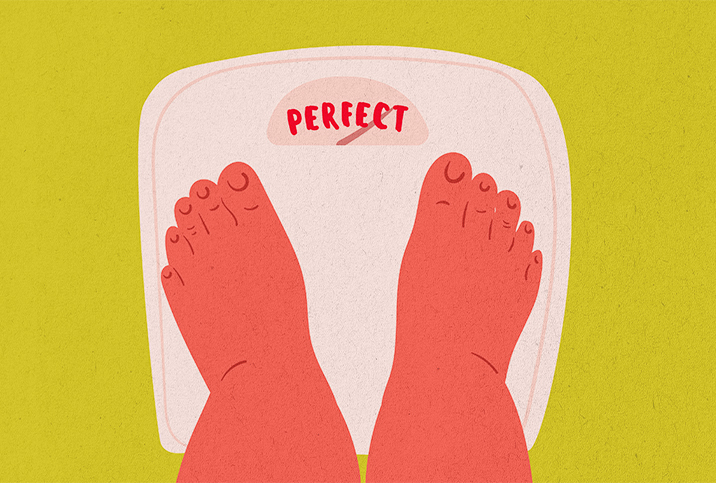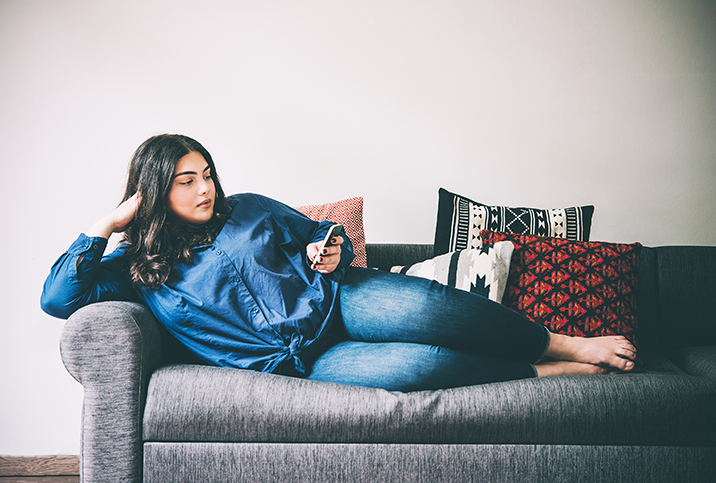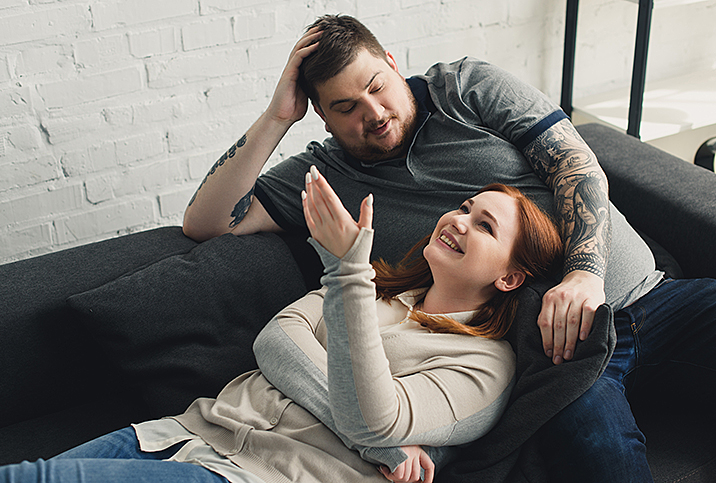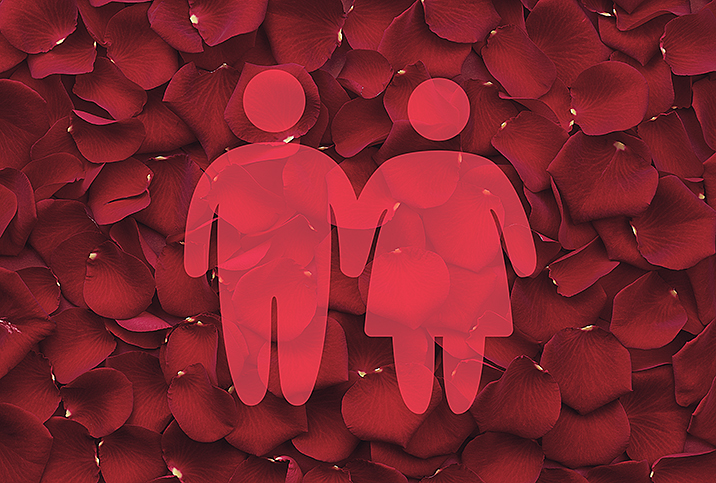Keep Body Image Issues From Messing With Your Sex Life

While brainstorming gift ideas for my husband, a friend suggested I buy sexy lingerie and present myself as the present. "I don't know," I said, resistant to the idea. "I'd probably just look fat."
My friend gasped. I write about sex for a living. I preach the gospel of body neutrality. And at the time of our conversation, my friend knew I was writing this piece.
Even as a self-aware sex and wellness writer, I'm only human, and body image issues are baked into our culture.
Fatphobia permeates so much of our lives, from the medical care we receive to how we choose to dress and feed our bodies to how we move through the world. And according to a 2021 article published in Archives of Sexual Behavior, it affects our sex lives, too. Research shows that when individuals are unhappy with their bodies, they experience sexual anxiety, which makes it difficult for them to enjoy sex.
This makes sense. Body insecurity shows up in numerous ways in the bedroom. We worry about how we look in certain sex positions—we're preoccupied with whether or not the lights are on or off. However, according to clinical social worker Sonalee Rashatwar, no matter how it manifests, all these distracting thoughts have the same effect: They take us out of the moment we're supposed to be enjoying.
How can we more fully embrace pleasurable sex in our larger bodies? Here are some ideas you might like to try.
First, a grounding exercise
Because our internalized fatphobia can distract us and prevent us from enjoying sex, let's consider how we can become more present.
Rashatwar suggests engaging in a grounding exercise, first practicing it outside the bedroom and then using it during times of physical intimacy in order to remain in the moment. One popular grounding technique is the 5-4-3-2-1 exercise. For this exercise, you come up with five things you can see, four things you can feel, three things you can hear, two things you can smell and one thing you can taste. These steps help anchor you to the present moment.
Once you're ready to move to the bedroom, you might dim the lights, play some music you enjoy or use aromatherapy to spice up the mood. You can tune into these sounds or smells if you find yourself feeling anxious or distracted.
Tell your partner what's bothering you
If you're struggling with something in the bedroom, it's not a "you" problem—it's a couple's problem. This is why the key to working through sexual issues so often comes down to communication. Nat DiFrank, a comprehensive and trauma-informed sex educator, warned against burying those feelings of internalized fatphobia.
"What happens, especially with anxiety, is that repetitive thoughts end up getting taken as fact within your head," DiFrank said. "I think releasing them in some way and getting them out with your partners can be a really big way of figuring out if you are potentially getting triggered."
Accept yourself for who you are
DiFrank explained communication around internalized fatphobia can be particularly fraught, as there's so much shame around even identifying as fat.
"Using the word 'fat' in a neutral way can be good," DiFrank said. "I feel like that can be something that really changes people's minds about how they see themselves."
Rashatwar agreed that in order to be a person in a large body and stay present during sex—and not get distracted by the worry of how others perceive your body—you must find acceptance.
"If I really accept that my body is the size that it is, I'm not going to worry about contorting it into different positions so it looks as small as possible," Rashatwar said. "I'm not going to worry about it jiggling or wiggling when I'm on top. The best sex advice I've ever received? 'Your partner knows how fat you are.' It was so liberating to hear that. It relieved that pressure of feeling I had to constantly shrink myself during the experience."
Expand your definition of sex
Many of the stumbling blocks we experience in the bedroom can be avoided or minimized if we expand our definition of sex.
The most commonly used definition for sex—penis-in-vagina (PIV) penetrative intercourse—is extremely limiting. Not only does it exclude various genders, sexualities and abilities, but it leaves out a wide range of intimate acts, from which people derive sexual pleasure.
For fat folks, navigating certain positions can feel uncomfortable, and using certain toys can be unwieldy. If you want to incorporate toys into your sex play, consider those with longer handles or wider curves. If a position feels inaccessible, use pillows as props to make things comfier.
'If I really accept that my body is the size that it is, I'm not going to worry about contorting it into different positions so it looks as small as possible.'
For example, if you like the missionary position, place a pillow beneath your hips to give you and your partner more space where your bodies meet. If you'd like to be entered from behind but supporting your weight with your hands and wrists is uncomfortable, rest on your forearms instead, perhaps placing a pillow beneath your torso, or lie on your side. You can do a sideways 69, too, if you're in the mood for oral sex. This version is far less strenuous than the classic 69 and can make the genitals easier to access.
Just as every yoga pose has a modification to make it more accessible, sex positions can be modified, too.
Your internalized fatphobia is not your fault
Tips and tricks aside, it's important to realize that what you're feeling is not your fault. Internalized fatphobia is a systemic problem.
"It's really hard to have a body," Rashatwar said. "There's a multibillion dollar industry that works to make sure we feel dissatisfied with our bodies. It's not our responsibility to carry that burden of shame."
We lose so much when we fall prey to systemic messages about our bodies. Rashatwar pointed out that people with internalized fatphobia often end up in toxic relationships or settle for unsatisfying sex because they feel they're unworthy of something better.
"It damages our self-worth and impacts our body image and ability to consent," Rashatwar said. "If I believe my body is inadequate, I might be less willing to protect it...to advocate for it...to ask for what I really need."
We hope you realize you're more than enough. We hope you demand and enjoy sex that feels amazing.
You deserve it.


















